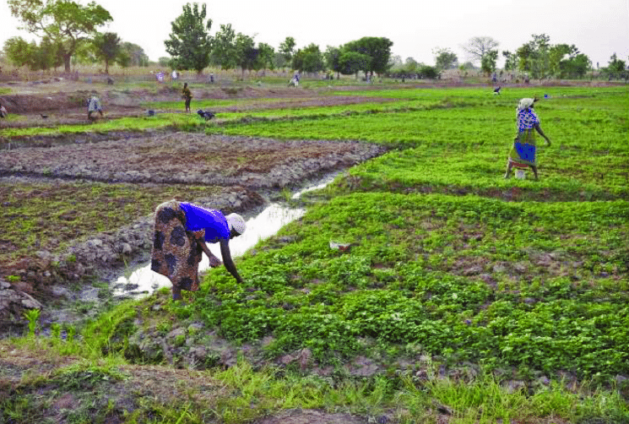The General Secretary of the General Agricultural Workers Union, Edward Kareweh, has said that the Ministry of Agriculture’s policy for 2022 would significantly contribute to a low agricultural output for the year 2022.
According to him, the policy which was made withithout consulting key stakeholders from the agric sector, poses several challenges to farming communities across the country.
Explaining the policy, he mentioned that government’s plan to reduce fertilizer subsidies to 15% as well as the reduction of the quantity of fertilizer to be supplied will mean that farmers would have to downsize their production in order to address the challenge.
Speaking on PM Express Business Edition, on Thursday, he explained, “If we look at the policy of the Ministry as we talk now, it is already indicating that they have planned through their policy for a low output at the end of 2022.
“One, the Ministry on its own without even consultations with those who are beneficiaries of the subsidy decided that we are going to reduce the subsidy, which is not even 50%, because they told us that it was 50%.
“As at last year it was 36-38%, now on their own they have reduced it to 15% and then apart from that, the Ministry is telling us that this year’s subsidized fertilizer, the quantity will not be more than 50% of what was supplied last year.
“So it means that they are scaling down first on price, I mean, the subsidy level to 15%, and second the quantity as against previous year, then the third one, has to now do with the fact that these external factors are confronting us.”
He added that the food price inflation currently being experienced will continue for as long as the situation the policy will create persists.
“So if today this is your policy, one because of the general cost of production, the farmers will cut down their total acreage that they will farm this year, because land preparation cost is there, transport cost is there, labour cost is there, pesticides cost is there, which have all ballooned, so farmers are all constrained.
“So they will first cut down their number of acreage. Two, because there is going to be low fertilizer application as a result of the inability of the farmer to be able to purchase the number of bags that he used to buy because the subsidy has come down, and because price of the fertilizer itself has even gone up over double, all this put together means there is going to be low yield and then aggregate will have low output for 2022,” he said.
Latest Stories
-
Maame Samma Peprah takes over as Ag. Registrar of Companies, pledges teamwork and continuity
14 minutes -
King Charles meets Carney in symbolic support for Canada
26 minutes -
Police release new evidence in timeline of Gene Hackman and his wife’s death
39 minutes -
No novelty, NDC just changed funding route – Amin Adam on uncapping GETFund
56 minutes -
Gov’t introduces or scraps tax based on times, this isn’t the first taxes removal – Amin Adam
1 hour -
Pharmaceutical Society of Ghana reschedules Pharma Excellence Awards to April 11, 2025
2 hours -
Scrapping of nuisance taxes poses risk to government’s revenue target – Deloitte
2 hours -
Ghana’s expected growth rate of 4% reasonable and achievable – Deloitte
3 hours -
World Cup 2026Q: Salisu, Kamaldeen lead early arrivals as Black Stars open camp
3 hours -
I expressed my reservations to GFA about decision to retain Otto Addo – Kofi Adams
3 hours -
Cedi’s losing streak continues; one dollar equals GH¢16.00
3 hours -
A progressive response to National Economic Dialogue 2025: Centering climate justice and a just energy transition
3 hours -
Harvard offers free tuition to families earning less than $200,000
3 hours -
Green tea may lower prostate cancer risk in older men, KNUST study finds
3 hours -
Deadline looms for Homeland Security to release Harry’s US visa records
3 hours

